Welcome to the week. Hope you are able to enjoy “spring break” even though it doesn’t feel that spring-y out right now.
Here’s what our community has been talking about for the past seven days…
‘Hell on earth’: It was striking to me how similar the anti-urban cycling arguments are in Paris to the ones we hear in America. (The Telegraph)
Trails momentum: A new US DOT program funded through the Bipartisan Infrastructure Law will give a boost to carfree path projects nationwide — it’s just a shame that so far only $45 million is on offer. (Associated Press)
The woes of car ownership: It’s truly jaw-dropping how much of American life is influenced by cars and car ownership — especially when you consider the financial strings cars attach to their owners. (Streetsblog USA)
Cougar attack: The woman who was attacked by a cougar in Washington last month is now telling the amazing story of how she and her riding buddies managed to fight back against the big cat. (KUOW)
Acknowledging a mistake: At least the EPA now fully admits that their own fuel economy standards are to blame for the massive shift in the American vehicle fleet to larger trucks and SUVs and the death of the sedan. (The New Republic)
Call for bollards: A horrific crash in San Francisco that killed a family of three has local activists calling for stronger leadership, stronger protection, and stronger enforcement. (Streetsblog SF)
Drugged-up: I had never heard of the Enhanced Games, where athletes are encouraged to take drugs before the competition. Now I’m curious if any cyclists — drugged-up or clean — will show up. (Canadian Cycling Magazine)
Third place for whomst?: A tony new club on the Central Eastside has at least one local journalist lamenting how a much-needed “third place” is now pay-to-play. (Portland Mercury)
Cleaner cars: President Joe Biden announced stronger emissions requirements that could force a much quicker transition to electric cars and pundits call it one of the most significant climate regulations ever. (NY Times)
Thanks to everyone who sent in links this week. The Monday Roundup is a community effort, so please feel free to send us any great stories you come across.



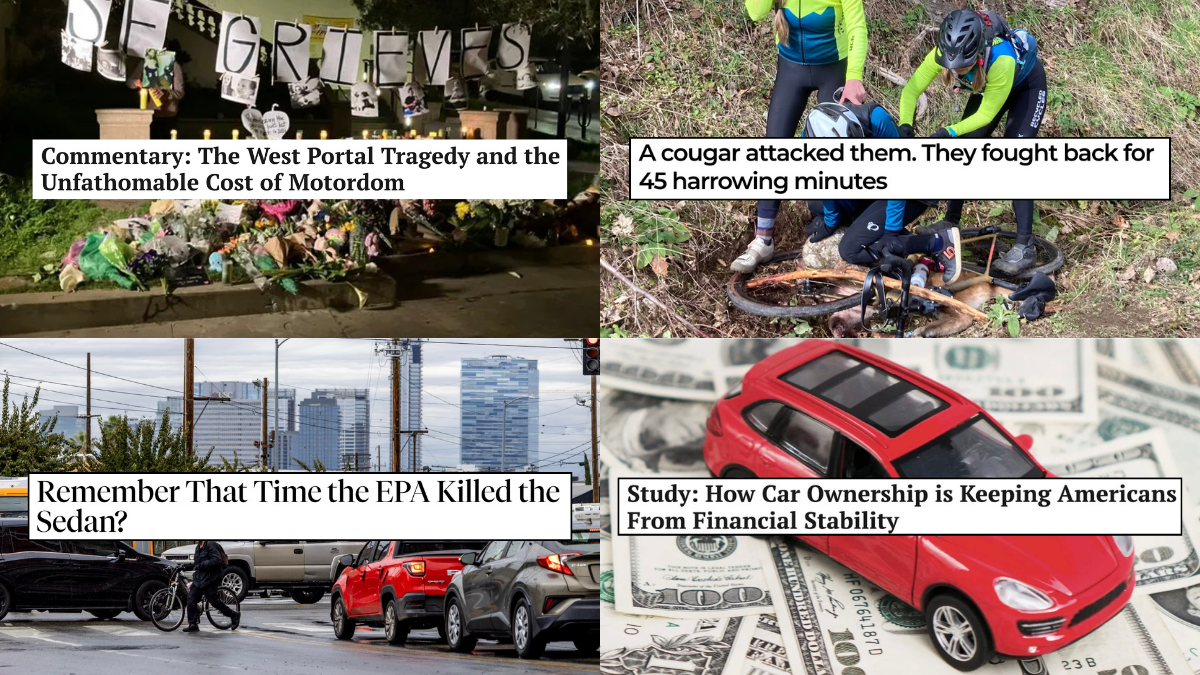
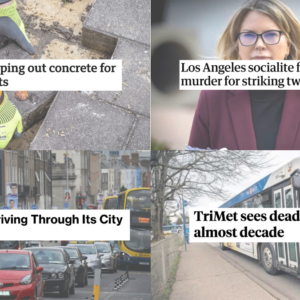
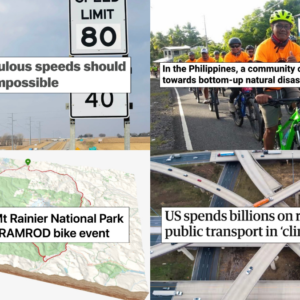
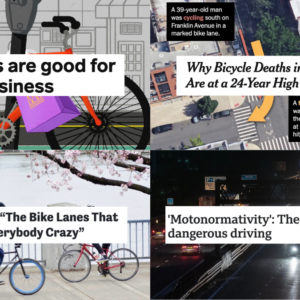
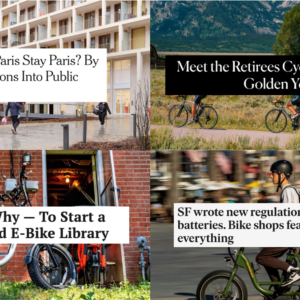
Thanks for reading.
BikePortland has served this community with independent community journalism since 2005. We rely on subscriptions from readers like you to survive. Your financial support is vital in keeping this valuable resource alive and well.
Please subscribe today to strengthen and expand our work.
That cougar story is amazing. Wow.
Wow yeah! I could feel my heart rate increasing as I read further. Keri is hardcore!!
Third place for whomst?: Exclusive clubs gonna exclude. Otherwise, what’s the point?
I appreciated Taylor’s takedown of the Soho club, but it seemed pretty reactionary. Exclusionary clubs like the MAC, or the Racquet Club, or a country club are all pretty distasteful and elitist, but they are effective third places for people who can afford them. The Soho Club is using cynical marketing to appeal to cynical marketeers by pretending to be a cool and creative space. I think the article missed the opportunity to discuss the erosion of our public space- parks, natural areas, streets, sidewalks and plazas by a number of factors: privatization by business interests, occupation by homeless people, degradation by antisocial behavior- selling drugs, violence, littering and graffiti, and a lack of care and intention by the City. I passionately care about preserving public spaces, and I feel the article completly misses the mark with this unnecessary aside:
The dog run is a not a primary attraction, it will only occupy 5-10% of the park- it will be fenced but not locked as are nearly all dog parks in Portland. This will not be locked and will available to all downtown residents and visitors including hotel guests and people staying at the Multnomah County Behavioral Health Resource Center. The majority of the park will be devoted to a wide range of programming to determine the best fit for the location. These will include lunch time concerts, larger performances, and active recreation like temporary ice skating. These will all be available to the public, though not all will be free. Food carts will not be included because the City has invested significant resources in the food cart pod 1-1/2 blocks to the north. The park will be a location to try food trucks, newly allowed by the City and available to try without the required permanent infrastructure. The fence around the park will not keep homeless people out, it will exclude everyone at night and allow everyone in during the day. While this is a controversial departure from PP&R practice, this false characterization is not responsible journalism. They City has committed to provided a public space that supports many free events, particularly events in support of the LGBTQIA community, and I take issue with the article’s characterization that it is intended to become an enclave for the rich, especially when the author’s only suggestion for activation is to commercialize the space.
The Soho house is another gross example of rich people doing rich people things, but it does underscore the need to vigilantly protect, develop and restore our free public spaces.
And expand them in neighborhoods where we want to add population.
Great news about Keri surviving the cougar attack with the help of her friends. Absolutely a bunch of ferocious survivors!!
To demonstrate how dangerous a cougar that attacks is, a young man was killed east of Sacramento over the weekend.
https://www.nbcsandiego.com/news/california/man-survives-norcal-mountain-lion-attack-that-killed-his-brother-expects-to-recover/3470068/
I’m not wanting to start a conflict, but (theres always a “but”, right?!?) the fight with the cougar ended when it was shot. Hopefully people will think about taking a firearms safety class to decide if carrying a firearm is right for them.
I fully agree that avoidance is the best policy, but sometimes the predator persists and it’s best to be prepared.
The chances of being attacked by a cougar are stunningly low. No need to bring more firearms into an already armed to the teeth society!
https://en.wikipedia.org/wiki/List_of_fatal_cougar_attacks_in_North_America
I see Keri and her friends made the Wikipedia article you mention as an example of fighting off a cougar, pretty neat! I agree that cougar and other predator attacks (wild animal and otherwise) in the woods have been on the low side. I am also a believer in climate change and I know that past predictions are not going to be able to be the guide that they used to be. Firearm use is just something to think about as our social situation changes and the climate crisis begins to manifest itself up here in the PNW. Because of the ongoing climate change and the unfolding climate crisis I do not believe that our current society that has shaped our views on morality and civil behavior will remain unchanged.
Actually, the fight with the young cougar that attacked the woman cyclist ended after her friends were able to get it to let go by beating, stabbing and hitting it with a rock. They then pinned it under one of the bikes that they stood on top of. The cougar was shot 30 minutes later by the ranger that responded to their 911 call. Rather than carrying a firearm, I wonder how big cats would respond to bear spray?
* EVs are built with coal and gas energy, their batteries are built with coal and gas energy, and they are powered with electricity from coal and gas power plants.
* The lithium and cobalt in batteries is an environmental nightmare that strip-mines unspolit nature and poisons people in low-income and indigenous communities.
* EVs are also far, far heavier resulting in a dramatic increase in death and injury.
* EVs are luxury vehicles that target the rich and have massive rebates/tax credits that further enrich the rich.
Purchasing an EVs is the single worst thing you can do for the environment and for equity!
/s
I mean, other than the superlatives…no lies detected.
EVs are also anti-worker because they 1) have fewer moving parts and will result in massive layoffs of autoworkers, 2) are more reliable than vehicles propelled by small explosions and will result in massive automobile repair worker layoffs, and 3) foreign EV companies produce cheaper and more technologically-advanced EVs which will result in massive layoffs across the entire US automobile industry.
Essentially anyone who even thinks about buying or driving an EV is anti-worker, a climate arsonist, an ecological poisoner, and a sycophant of the mooching-rich.
Won’t someone please think of the poor folks who make their living changing transmission fluid and replacing brake pads?!?
…parody? Honestly can’t tell with the BP comments sometimes (so if so, well done!)
Was that really /s? I agree with the general drift of the comment, although I’d have to take a look at ‘eating 235 pounds of meat a year’ and ‘having 2.5 children in the US’ before I made an absolute statement.
One of the worst things about putting a lot of resources like labor, manufacturing capacity, steel, minerals, government finance, etc. into personal electric vehicles is that those resources become unavailable for public use. It costs more and we literally have to dig deeper to produce things like battery powered buses, grid power storage, quieter and cleaner delivery trucks and so on. Those are assets that can be used by a lot of people for a much larger amount of time. They aren’t stored on residential streets and they don’t suck up valuable real estate in commercial districts.
I’m not directly affected by my neighbor’s choice to buy an EV until they park it in the street. On-street parking is possibly the greatest stumbling block for active transportation infrastructure in Portland. NE Sandy Boulevard, with all of its issues, would be a very useful bike route if a few dozen car parking choke points went away. It’s a damn shame that roads like Sandy and Barbur, paralleled by major freeways for most of their length, don’t have world class bus rapid transit and bikeways that cross major axes of the city. It’s good politics but a failure of vision by the Biden administration to lean so hard on EVs.
“People Hate the Idea of Car-Free Cities – Until They Live in One.”
That headline certainly got my attention. But where’s the article?
Aack! Sorry Douglas. I ended up not using that story because it was 2 years old. I have edited the graphic.
Here’s the article though if you’d like to read it – https://www.wired.com/story/car-free-cities-opposition/
West Portal is a tragic reminder of what happened to Jeanie Diaz. It is indefensible to leave places next to roads where pedestrians congregate, like bus stops, unprotected by hard infrastructure. The real reason that bus stops are not protected is the perception that poor people are the primary users of public transportation.
I will not become inured to personal tragedy no matter prevalent it becomes. A kid will grow up, perhaps, with the significant fact known about their family being that they all died in a car crash. It’s awful.
This was avoidable on the simple grounds that private motor vehicles should not be privileged over a transit line. There was a well known pattern of car drivers acting out to beat the train. It’s not a hard decision to figure out what was the right thing to do. We have to stop waiting until people are very horribly killed to fix things.
EPA acknowledges their mistake…
American autos aren’t bigger because consumers have suddenly embraced off-roading, the construction trades, or home improvement projects. They’re bigger because automakers want to escape regulations.
This is so damn disgusting!
I say it’s time to tax & regulate vehicles and based on their size, weight, top speed, stopping distance, and vulnerable road user detection.
Automakers should be taxed & regulated based on their safety outcomes, add emissions in there too.
Just curious, has anyone heard anything about the Forest Service banning e-bikes in the gorge?
I saw a post on the Portland Reddit this morning, but it didn’t have any sources and has since been deleted.
I haven’t heard anything John D but if you hear more please get in touch with me maus.jonathan@gmail.com
I have pretty good sources in the Gorge so I assume if something major came down I would know, but I always appreciate help with news tips. Thanks.
E-bikes have not been permitted for as long as I know at the Syncline /Coyote Wall trail system so perhaps that was the Gorge reference? That said, I do see them fairly regularly out there.